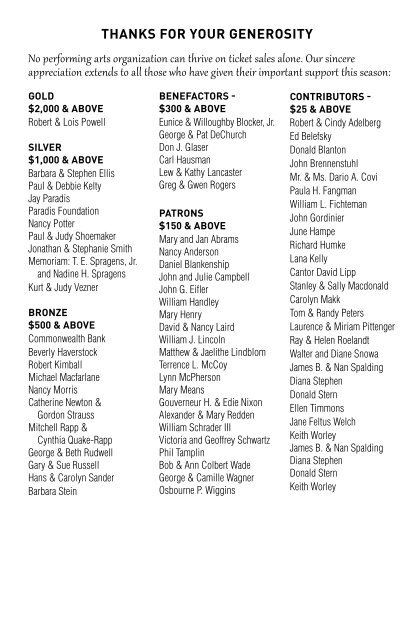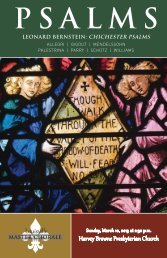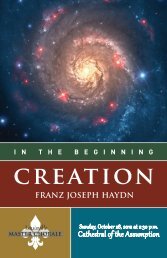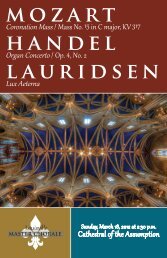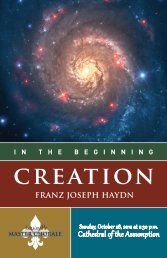program - The Louisville Master Chorale
program - The Louisville Master Chorale
program - The Louisville Master Chorale
Create successful ePaper yourself
Turn your PDF publications into a flip-book with our unique Google optimized e-Paper software.
GOLD<br />
$2,000 & ABOVE<br />
Robert & Lois Powell<br />
SILVER<br />
$1,000 & ABOVE<br />
Barbara & Stephen Ellis<br />
Paul & Debbie Kelty<br />
Jay Paradis<br />
Paradis Foundation<br />
Nancy Potter<br />
Paul & Judy Shoemaker<br />
Jonathan & Stephanie Smith<br />
Memoriam: T. E. Spragens, Jr.<br />
and Nadine H. Spragens<br />
Kurt & Judy Vezner<br />
BRONZE<br />
$500 & ABOVE<br />
Commonwealth Bank<br />
Beverly Haverstock<br />
Robert Kimball<br />
Michael Macfarlane<br />
Nancy Morris<br />
Catherine Newton &<br />
Gordon Strauss<br />
Mitchell Rapp &<br />
Cynthia Quake-Rapp<br />
George & Beth Rudwell<br />
Gary & Sue Russell<br />
Hans & Carolyn Sander<br />
Barbara Stein<br />
THANKS FOR YOUR GENEROSITY<br />
No performing arts organization can thrive on ticket sales alone. Our sincere<br />
appreciation extends to all those who have given their important support this season:<br />
BENEFACTORS -<br />
$300 & ABOVE<br />
Eunice & Willoughby Blocker, Jr.<br />
George & Pat DeChurch<br />
Don J. Glaser<br />
Carl Hausman<br />
Lew & Kathy Lancaster<br />
Greg & Gwen Rogers<br />
PATRONS<br />
$150 & ABOVE<br />
Mary and Jan Abrams<br />
Nancy Anderson<br />
Daniel Blankenship<br />
John and Julie Campbell<br />
John G. Eifler<br />
William Handley<br />
Mary Henry<br />
David & Nancy Laird<br />
William J. Lincoln<br />
Matthew & Jaelithe Lindblom<br />
Terrence L. McCoy<br />
Lynn McPherson<br />
Mary Means<br />
Gouverneur H. & Edie Nixon<br />
Alexander & Mary Redden<br />
William Schrader III<br />
Victoria and Geoffrey Schwartz<br />
Phil Tamplin<br />
Bob & Ann Colbert Wade<br />
George & Camille Wagner<br />
Osbourne P. Wiggins<br />
CONTRIBUTORS -<br />
$25 & ABOVE<br />
Robert & Cindy Adelberg<br />
Ed Belefsky<br />
Donald Blanton<br />
John Brennenstuhl<br />
Mr. & Ms. Dario A. Covi<br />
Paula H. Fangman<br />
William L. Fichteman<br />
John Gordinier<br />
June Hampe<br />
Richard Humke<br />
Lana Kelly<br />
Cantor David Lipp<br />
Stanley & Sally Macdonald<br />
Carolyn Makk<br />
Tom & Randy Peters<br />
Laurence & Miriam Pittenger<br />
Ray & Helen Roelandt<br />
Walter and Diane Snowa<br />
James B. & Nan Spalding<br />
Diana Stephen<br />
Donald Stern<br />
Ellen Timmons<br />
Jane Feltus Welch<br />
Keith Worley<br />
James B. & Nan Spalding<br />
Diana Stephen<br />
Donald Stern<br />
Keith Worley<br />
PRE-CONCERT LECTURE<br />
MORE THAN THE HALLELUJAH: NARRATIVE AND EMOTION IN MESSIAH<br />
DAVID PAUL GIBSON, a native of <strong>Louisville</strong>, Kentucky, has<br />
been active in the education and liturgical arts communities for<br />
over thirty-five years, serving as a music educator, director of<br />
sacred music and the arts, conductor, composer, and theatre artist.<br />
Mr. Gibson holds both a Bachelor of Music degree and <strong>Master</strong><br />
of Music degree from Western Kentucky University. In April<br />
2011 Gibson was inducted into the university’s Department of<br />
Music Hall of Fame in honor of his contributions to the fields of<br />
music education and church music. Recently, Western Kentucky<br />
University announced the endowment of the David Paul Gibson Scholarship in Music for Vocal<br />
Studies, underwritten in his honor.<br />
Mr. Gibson currently resides in <strong>Louisville</strong>, Kentucky, where he serves as the Director of Music at<br />
St. Lawrence Catholic Church and continues to compose.<br />
PROGRAM NOTES<br />
“I did think I did see all Heaven before me, and the great God himself.” — <strong>The</strong> words of George Frederick<br />
Handel, uttered as he was composing what is universally considered to be the greatest oratorio ever written,<br />
Messiah. <strong>The</strong>re is no overstating its impact. Huge in scale, sublime in concept, unfaltering in its eloquence,<br />
Messiah is a work of musical majesty and spiritual nobility that has never been surpassed.<br />
Messiah was composed over a period of less than a month – from August 22nd and September 14th, 1741<br />
– and received its premiere in Dublin on April 13th, 1742. While Handel based his other oratorios on the Old<br />
Testament and themes from Jewish history, the Messiah text was largely drawn from the New Testament. It was<br />
compiled by Handel’s friend and part-time poet, Charles Jennens, and relates in compressed form the story of<br />
the life of Christ.<br />
<strong>The</strong> late Handel scholar Jens Peter Larsen gave this succinct description of Messiah: “Messiah is not, as is<br />
often popularly supposed, a number of scenes from the Life of Jesus linked together to form a certain dramatic<br />
whole, but a representation of the fulfillment of Redemption through the Redeemer, Messiah. Messiah is divided<br />
into three Parts, the contents of which can be summarized as follows: 1.) <strong>The</strong> prophecy and realization of God’s<br />
Plan to redeem mankind by the coming of the Messiah; 2.) <strong>The</strong> accomplishment of redemption by the sacrifice<br />
of Jesus, mankind’s rejection of God’s offer and mankind’s utter defeat when trying to oppose the power of the<br />
Almighty; and 3.) A Hymn of Thanksgiving for the final overthrow of Death.”<br />
Having been composed in the incredibly short period of twenty-four days, during the writing of Messiah Handel<br />
was obviously never more inspired. While known during his lifetime as a “worldly” man, e.g., who can forget<br />
Berlioz’s characterization of Handel as “a tub of pork and beer”? And never seen as a religious man in the same<br />
sense as Bach – by all accounts Handel was for over three weeks a man spiritually on fire. <strong>The</strong> stories go that<br />
over and over servants found him in tears and in a trance-like state as if under an uninterrupted spell. He did<br />
not leave his house, allowed no visitors to disturb him, left virtually all food brought to him untouched except<br />
for an occasional piece of bread, and shunned sleep so that it would not interrupt his furious creativity. Handel<br />
believed that he served as the vehicle through which God Himself wrote Messiah. <strong>The</strong> inspiration behind what<br />
has to be considered Handel’s greatest masterpiece is truly remarkable. (Continued on next page)


